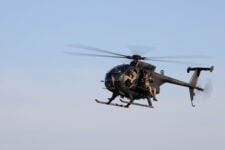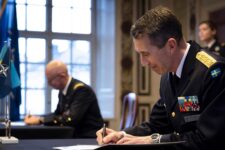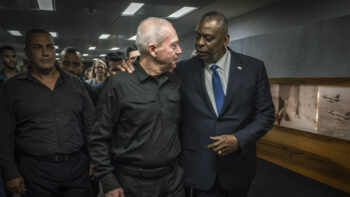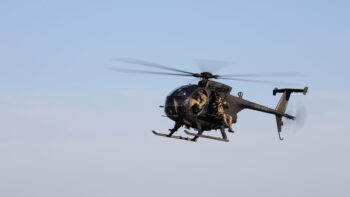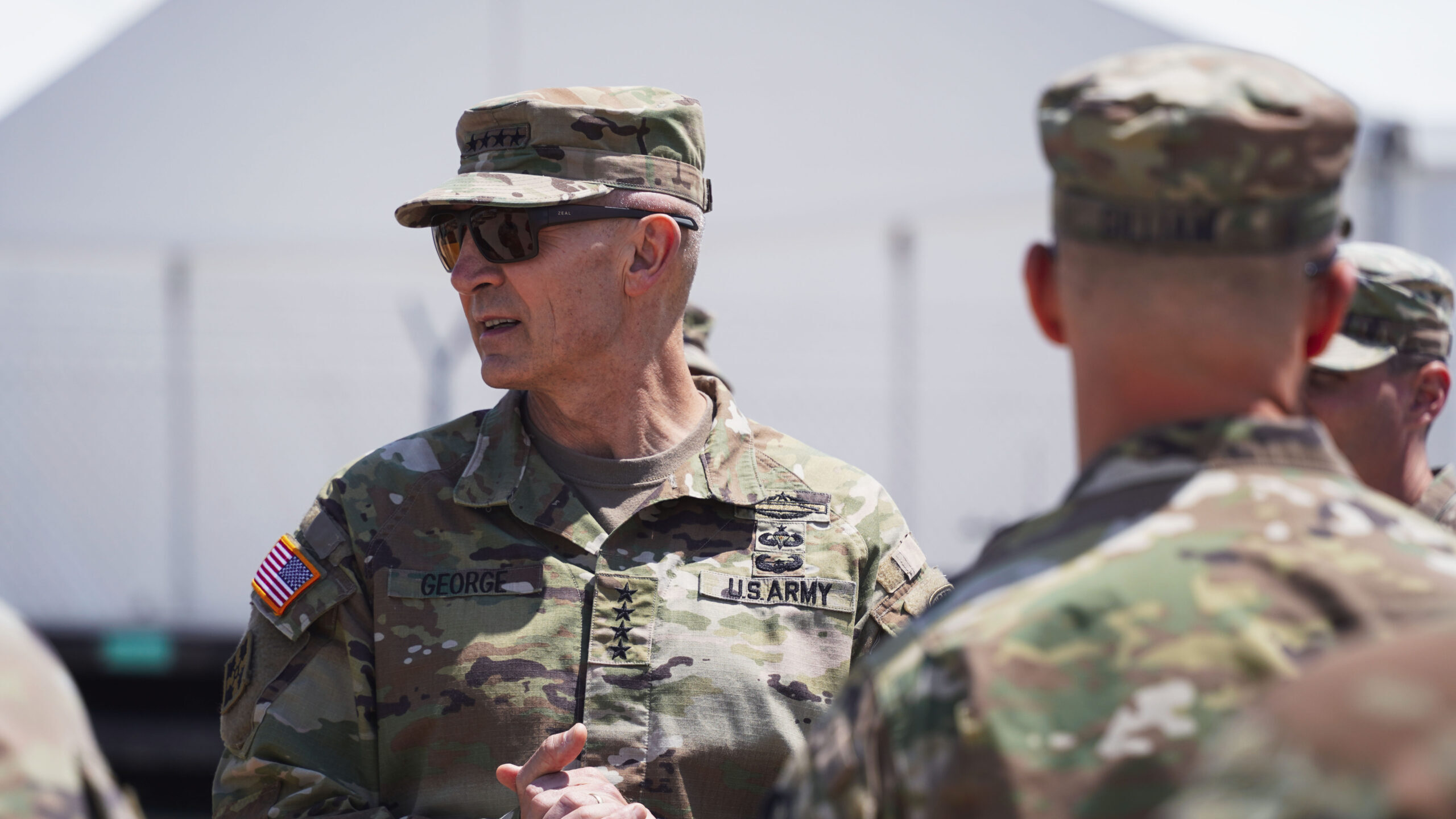
Vice Chief of Staff of the Army Gen. Randy George speaks with soldiers during the Warfighter Exercise 23-4 at Fort Hood, Texas, April 24, 2023. (US Army photo by Staff Sgt. LaShic Patterson)
WASHINGTON — Addressing Army recruiting woes and the soldier shortfall will be one of Gen. Randy George’s top priorities when he is sworn in as the next service chief, he told senators during his confirmation hearing today.
For the second day in a row, the Senate Armed Services Committee convened a high-profile confirmation hearing, this time to hear from President Joe Biden’s pick to be the next Army Chief of Staff. While the lawmakers debated among themselves topics related to accusations of a “woke” military and one lawmaker’s procedural maneuver holding up senior level military leaders’ votes, George’s hearing, by and large, proceeded smoothly.
“Perhaps your most pressing challenge… will be addressing the Army’s recruiting crisis,” committee chairman Sen. Jack Reed, D-RI, said. “I would argue that all our own military services are facing their most severe recruiting challenges since the establishment of the volunteer force 50 years ago.”
Lawmakers from both sides of the aisle reiterated this concern, and George said he agrees.
“It’s the number one challenge that we face and the one thing that we have to be focused on,” he told senators.
As the current vice-chief of staff, George noted that he has been working with other service leaders to turn the recruiting shortfall around through programs like the future soldier prep course and looking for ways to select better recruiters.
But while numbers are down, Army leaders, including George, have been examining where the service could make cuts to better use the soldiers they have, including a possible 10 to 20 percent reduction to its special operation force (SOF).
“There’s been no decisions made,” George told lawmakers, but he said the service is studying just what number of SOF the joint force may need in the future.
With that decision, and others, in flux, it is not yet clear how many soldiers the Army will end fiscal 2023 with on Sept. 30, and what its actual year-end recruiting figures will be. However, in May, Secretary Christine Wormuth warned lawmakers the service expects fall short of its “ambitious goal of 65,000 new recruits.” (Service officials had previously aimed to start FY24 with 452,000 active-duty soldiers.)
Recruiting aside, senators today were also interested in hearing what the Army has learned from the ongoing war in Ukraine. Although George did not disclose any new sweeping assumptions that may upend the service’s weapon modernization plan or how soldiers organize, train and fight, he noted the continued importance of allies and partners, logistics (to include 3-D printing), long-range fires and air defense.
“We’re learning how difficult offensive operations are and what you have to do,” he added.
By and large, George’s hearing was firework-free except for disagreements among senators over political issues and Alabama Republican Sen. Tommy Tuberville’s high-profile blockade of military appointments. If the committee ultimately votes in favor of George’s appointment, his name will be sent up to leadership for a vote on the floor.
In the meantime, though, Biden has picked Lt. Gen. James Mingus to succeed George and become the next Army vice chief, according to a notice posted Tuesday in the Congressional record. Mingus has been serving in different roles on the joint staff since 2020.
The Tuberville Blockade
While George and eventually Mingus will need full Senate approval before stepping into their nominated roles, it is unclear when that will happen due to Tuberville’s hold. His protest centers around a military reproductive policy that reimburses service members travel expenses including for abortions.
Although the armed services committee is able to consider nominations like George’s and send them to the full chamber for individual consideration, Tuberville’s hold prevents the full chamber from voting on groups of nominees together.
Reed estimated that the committee has now sent up the names of 250 senior military leaders awaiting promotions, and if each one was considered separately, the chamber will spend 668 hours, or 83 eight-hour days just working to get them approved.
“That is an impossible goal to achieve,” Reed said at the end of the hearing. “And, by the way, that would prevent us from dealing with issues like the national defense authorization act, appropriations bill, and other important legislation.”
Tuberville, also on the armed service committee, apologized to George for the topic eating up time at his hearing but didn’t dive into the debate today, though other Republican lawmakers did defend his decision.
While Tuberville’s hold drags on, its impact can now be felt at the upper echelons of the Pentagon. Just earlier this week, the Marine Corps became the first service without a Senate-confirmed uniformed leader when Commandant Gen. David Berger departed his post. Gen. Eric Smith is tapped to take over but because he has not been confirmed, he is running to service on a temporary basis while simultaneously keeping his current position as the USMC vice-chief.
RELATED: A real ‘ripple effect’: Why it matters Smith will be ‘acting’ Marine Corps commandant
The Army will face a similar fate early next month when Chief of Staff Gen. James McConville’s term sunsets, and the Navy will trail behind weeks later when Chief of Naval Operations Adm. Michael Gilday is required by law to step down. (The White House has not yet announced who it wants to step into the role as Gilday’s replacement.)
Army Gen Mark Milley must also vacate his seat as the chairman of the Joint Chiefs of Staff around the October timeframe, and Biden’s pick to replace him, Air Force Chief Gen CQ Brown, faces the same holdup. At Brown’s own confirmation hearing Tuesday, he warned the political logjam would cause the military to “lose talent.”
Long story short, the Pentagon is facing the prospect of not having Senate-confirmed military leaders heading up the Army, Navy, Marine Corps and Joint Chiefs.
“The longer these unprecedented holds remain, the greater risk the department runs in experiencing knowledge and expertise gaps in certain critical and often difficult-to-fill positions, and the downstream effects will continue to impact the readiness of the force,” Deputy Pentagon Press Secretary Sabrina Singh told reporters on Monday. “We urge Senator Tuberville to lift his hold and urge the Senate to confirm these exceptional general and flag officers.”
Estonian volunteers fighting in Ukraine are helping prepare Tallinn’s rapid response force
The head of the Estonian Scouts, among the first who would be called to fend off an invasion, said the “biggest part that’s going to change” is how the unit fights with and against drones.








